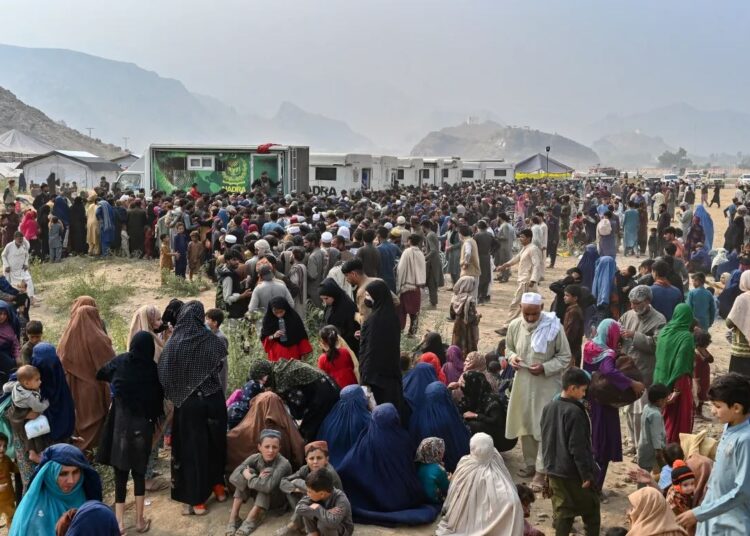With the rise of the primarily Pashtun Taliban, concerns are flourishing within Pakistan over a possible greater unification of Pashtuns transcending the border. This apprehension stems from the potential disruption it could cause to Pakistan’s pursuit of strategic depth.
By Mohammad Reza Bahrami
In Pakistan, the interim government of the country, under the authority of the Deep State, has initiated the implementation of a policy to deport all unauthorized foreigners, predominantly Afghan nationals, starting from November 1. The resulting heavy congestion at the Afghanistan-Pakistan border is indicative of a significant number of Afghans leaving Pakistan. Official reports estimate that nearly 200,000 individuals have departed, although the actual figure may be higher.
Despite protests from Taliban officials and certain Afghan figures not aligned with the Taliban, these objections have thus far failed to prompt a change in the policy in Islamabad. The security crisis in Pakistan, primarily driven by escalating insecurity propagated by groups such as Tehreek-e-Taliban Pakistan (TTP), Balochistan Liberation Army (BLA), Islamic State’s Pakistan Province (ISPP), and Tehreek-e-Jihad Pakistan (TJP), has worsened over the past year.
Pakistan’s motivation to exploit the issue of unauthorized immigrants as a card to exert pressure on the Taliban stems from several factors. Firstly, the Tehreek-e-Taliban Pakistan could exploit Afghanistan’s geographical proximity to its advantage. Secondly, the presence of Afghan nationals among the insecurity in Pakistan, and finally, the Taliban’s apparent lack of responsibility in working closely with Pakistan to address this issue, all contribute to Islamabad’s decision.
To gain a better understanding of the phenomenon of insecurity and its determining factors in Pakistan, the following points should be considered:
- In recent days, the aforementioned groups have carried out several operations in the provinces of Khyber Pakhtunkhwa, Baluchistan, and Punjab. Notably, Tehreek Jihad Pakistan (TJP) claimed responsibility for an operation targeting the Pakistan Air Force Training Center in Punjab province, which was different and more important from a security perspective.
- TJP officially announced its activities in February 2023, conducting operations in Baluchistan province. Reports indicate that the group had initially been a faction of TTP and aligned with Jamaat-ul-Ahrar until their separation due to peace talks between the Pakistani government and Tehreek-e-Taliban Pakistan (TTP) mediated by Sirajuddin Haqqani, the Taliban’s interior minister, in 2022.
- Following the second operation by TJP in Baluchistan province this year, Pakistani authorities publicly acknowledged the presence of Afghan nationals in the ranks of Pakistani extremist groups.
- The interrelatedness of various indigenous and non-indigenous extremist groups in the region, whether in Pakistan or Afghanistan, is complex and often interwoven, making it challenging to demarcate and separate them completely.
- A quick review of significant Tehreek-e-Taliban Pakistan (TTP) operations against important military centers in recent years provides a clearer understanding of the threat posed by these groups.
Notable examples include attacks on the Kamra airbase (2007), an airbase in Punjab (2009), the Mehran naval base in Karachi (2011), Minhas Airbase in Punjab (2012), the Peshawar air base (2012), Bannu prison (2012) resulting in the release of several hundred extremist prisoners, the old terminal of Karachi airport (2014), and the Khalid and Samungli air bases (2014).
In some instances, non-Pakistani extremist groups, primarily present in the Pashtun belt of Pakistan’s border with Afghanistan, collaborated with TTP in planning and executing these operations.
- Undeniably, the successful capture of Afghanistan by the Taliban in 2021 has invigorated the ambitions of other extremist groups based in the region, inspiring them to envision similar victories in alternate territorial landscapes.
- Marking the second instance within recent decades, ethnic sentiments have amplified among the Pakistani Pashtuns. These sentiments permeate both extremist groups and nationalist currents, by a robust opposition to the nation’s Deep State. With the rise of the primarily Pashtun Taliban, concerns are flourishing within Pakistan over a possible greater unification of Pashtuns transcending the border. This apprehension stems from the potential disruption it could cause to Pakistan’s pursuit of strategic depth.
- However, the escalating insecurity within Pakistan isn’t entirely attributable to extremist factions or domestic players. At its core, it appears the genesis of this developing crisis can be traced to the geopolitical competition within South Asia and beyond. Extremist groups, domestic actors—including Pashtuns and Baloch—are unwitting or witting components manipulated within this complex game.
- The United States retains an interest in incorporating both India and Pakistan into its regional strategic schema in South Asia. However, due to the existing dynamics in India-Pakistan relations, and the nations’ respective positions within regional and international power relations, the US has attributed a higher priority and distinct role to India for years. Complicating matters further is the strategic rivalry between China and the US in South Asia and Central Asia, impeding Pakistan’s efforts to maintain a balanced relationship with both nations and thereby restricting its diplomatic agility. Through its role as the land and maritime convergence point in the Belt and Road Initiative (BRI) and a key pillar of the China-Pakistan Economic Corridor (CPEC)—China’s flagship corridor project—Pakistan finds itself teetering on an axis between the antithetical perspectives of US and China towards materializing this project.
- The prospects of full containment of the Tehreek-e-Taliban Pakistan (TTP) by the Afghan Taliban are doubtful. This skepticism arises courtesy of the labyrinthine ethnic relations, historical collaboration, and established interconnectedness between varying factions and elements of both groups, making it practically impossible for any segment of the Taliban to enforce limited restraint on the TTP, as desired by Pakistan. Additionally, unpublicized orders from the Taliban leader, forbidding the Afghan Taliban from waging jihad in Pakistan, likely hold negligible deterrent effect over the extremists’ actions.
- The existence of internal fractures within the Taliban is a tangible reality, previously acknowledged. A certain spectrum of the Taliban, conceptually mirroring the outlook favored by some factions of the power-holders during the republican era, advocates for normalizing relations with the West, particularly the US, as a counterweight against regional powers.
In conclusion:
- Despite the prevailing challenges between Pakistan and the Taliban, it’s improbable that Pakistan intends to forgo its relationship with Afghanistan’s Taliban, particularly given the latter’s current governance in Kabul. Imagining a plausible alternative for Pakistan in this scenario is difficult. Instead, manipulating the intra-Taliban power dynamics appears to be a less costly strategy for Pakistan.
- The Taliban, beset with resource scarcity, is grappling to simultaneously navigate two complex phenomena: revamping its relationship with Pakistan and managing the impact of sizeable Afghan displacement from Pakistan. This struggle intensifies in the face of dwindling international aid and with the advent of the harsh winter season.
- Contrary to prevailing opinions, the possibility of the region’s developments being solely managed by existing local structures is unrealistic, especially when factoring in the substantial influence of developments transpiring in other regions.
- The large-scale deportation of Afghan refugees from Pakistan, coupled with the activation of certain non-Afghan extremist groups seeking to exploit these refugees, portends a foreseeable uptick in regional instability and the potential proliferation of extremism. The repercussions of these phenomena extend beyond Afghanistan’s national boundaries, threatening to destabilize the larger region.
The views expressed in this article are those of the author and do not necessarily reflect the positions of Iran Nuances.






